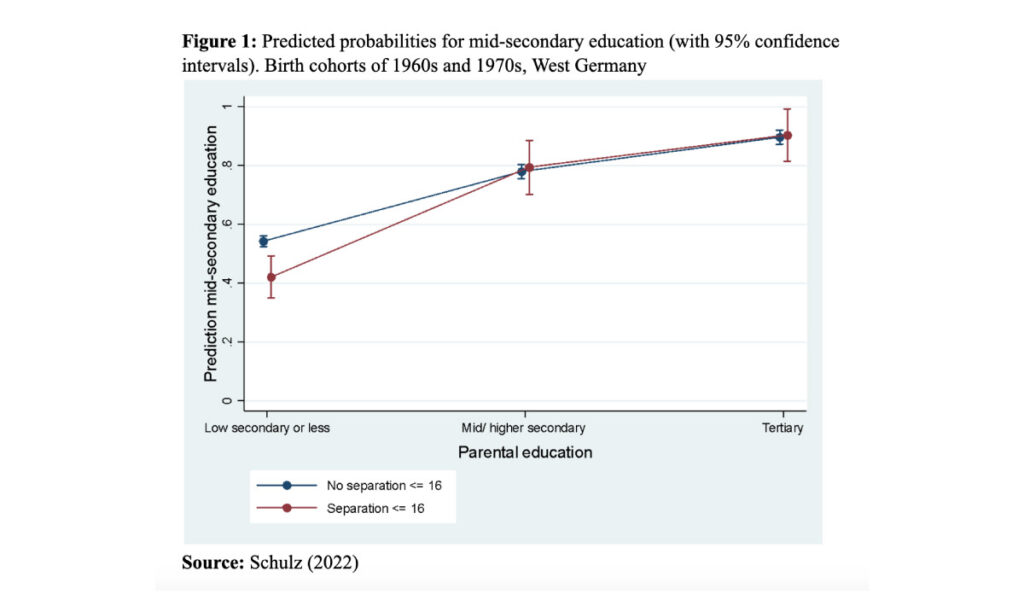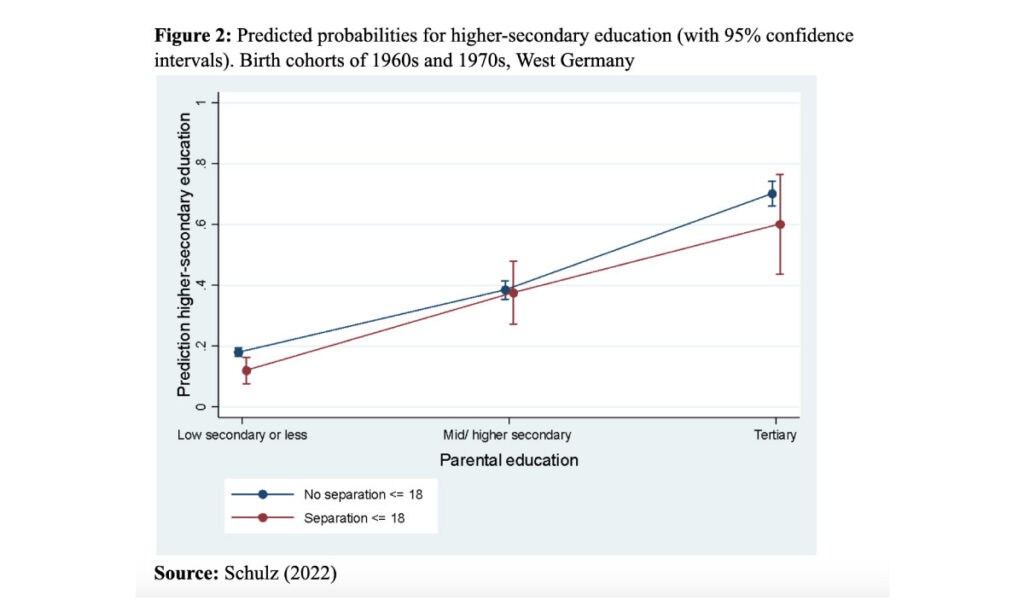
Children are not all equally influenced by parental separation. Wiebke Schulz shows that children with parents from a lower educational background have fewer chances of completing mid-secondary education. This is less true, however, for higher-secondary education.
Children who experience parental divorce or separation tend to attain lower levels of education. Upon separation, children may lose out on the social, financial, informational and relational resources that foster their learning and hence their educational attainment (Amato 2000). The extent to which this occurs, however, is known to depend on their socioeconomic background (Grätz 2015). In a recent study (Schulz 2022), I show that it also depends on the outcome of interest: completion of mid- or higher-secondary education.
A synthetic theoretical perspective
For lower educational outcomes, children from higher educational backgrounds may experience smaller penalties, because parental resources are sufficient to compensate for the losses incurred upon divorce. For instance, children with better educated parents are less likely to experience crucial changes in their environment and in their relationship with their parents, and thus might be less disturbed by the experience of parental separation. According to this “compensation perspective”, children from lower status backgrounds should suffer more from parental separation than children of better-educated parents (Bernardi 2014; Boudon 1998).
The compensation hypothesis may not be applicable to higher educational outcomes, however, where the consequences of parental separation may even be more severe for “privileged” children. Lower status children typically have less access to social origin resources that improve their chances of attaining higher levels of schooling in the first place, including information on the returns of higher education. This means that children from lower social backgrounds who successfully transition to advanced tracks are especially selected in terms of ability and motivation. The disturbances caused by parental separation may have fewer adverse effects on the educational career of this highly selected group. Conversely, higher status children, for whom completion of higher secondary education is the norm, may feel more harshly the loss of resources that would have been available if their parents had not separated: they have “more to lose”.
A case in point: West Germany
My analysis is based on a sample of 6,855 children born in the 1960s and 1970s in West Germany (German Life History Study). My main finding is that variations in parental separation consequences by parental educational background (the highest level of educational attainment of either mother or father) are in line with the compensation perspective: the consequences of parental separation on completion of mid-secondary education – and also to a certain extent higher-secondary education – were more severe for disadvantaged children, and indeed limited to this group.
Children from low educational backgrounds who experienced parental separation had considerably lower chances of completing mid-secondary education (Figure 1), while for children from mid- and high-educational backgrounds the chances did not vary meaningfully according to separation experience. Hence, for the case of mid-secondary education, the consequences of parental separation were limited to children from low status backgrounds, which provides support for the compensation perspective.

Children from lower educational backgrounds who experienced parental separation were likewise disadvantaged in their chances of completing higher-secondary education, although, in this case, to a much lesser extent. For children from higher status background, parental separation was much less strongly related to their chances of completing higher-secondary education and estimates are statistically insignificant. My conclusion, therefore, is that the “compensation hypothesis” also holds, albeit less so, for higher educational outcomes (see also Figure 2).

Conclusions
Considering more than one educational outcome highlights dynamics linking family processes and inequality that might otherwise go unrecognized. In Germany, a context with a strongly stratified and hierarchically organized education system, only disadvantaged children are adversely affected by separation, particularly at a low threshold (mid-secondary education). These unequal heterogeneous consequences could be missed in studies that focus only on higher levels of educational attainment. More broadly, this suggests that studies examining heterogeneous consequences, for example, regarding well-being and cognitive abilities, should move beyond mean effects and look at various points of the outcome distribution.
References
- Amato, P.R. (2000). The consequences of divorce for adults and children. Journal of Marriage and Family 62(4): 1269–1287. doi:10.1111/j.1741-3737.2000.01269.x.
- Bernardi, F. (2014). Compensatory advantage as a mechanism of educational inequality: A Regression Discontinuity based on month of birth. Sociology of Education 87(2): 74–88. doi:10.1177/0038040714524258.
- Boudon, R. (1998). Social mechanisms without black boxes. In: Hedström, P. and Swedberg, R. (eds.). Social mechanisms: An analytical approach to social theory. Cambridge University Press: 172–203. doi:10.1017/CBO9780511663901.008.
- Grätz, M. (2015). When Growing Up Without a Parent Does Not Hurt: Parental Separation and the Compensatory Effect of Social Origin. European Sociological Review 1–12. 10.1093/esr/jcv057
- Schulz, W. (2022). Do the consequences of parental separation for children’s educational success vary by parental education? The role of educational thresholds, Demographic Research, 47, S. 883 – 918. doi:10.4054/DemRes.2022.47.28
No comments:
Post a Comment